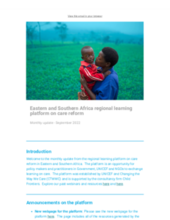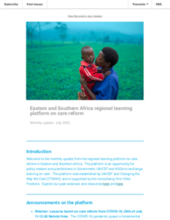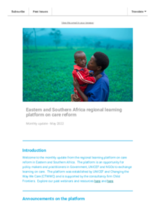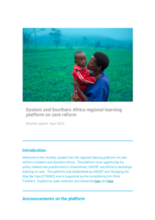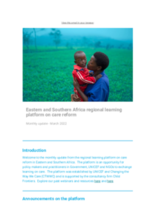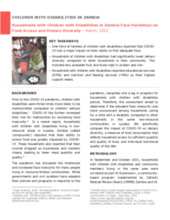childrens_living_arrangement
children_living_without_bio
Displaying 21 - 30 of 158
The video provides key lessons learnt from COVID-19 on care reform from interviews with UNICEF, government and NGO staff in Rwanda, Uganda, Malawi and Kenya.
The Eastern and Southern Africa Regional Learning Platform hosted a webinar on September 20, 2022, with panel of experts who explored how the social service workforce can be strengthened to support care reform in Eastern and Southern Africa.
This is the monthly update of the Eastern and Southern Africa Regional Learning Platform published in September 2022.
This is the monthly update of the Eastern and Southern Africa Regional Learning Platform published in July 2022.
This webinar co-hosted with the Changing the Way We Care (CTWWC) initiative is an opportunity to lift up how the Catholic Church is advancing safe and nurturing family care for children around the world.
This is the first monthly update of the Eastern and Southern Africa Regional Learning Platform published in May 2022.
This is the second monthly update of the Eastern and Southern Africa Regional Learning Platform published in April 2022.
This is the first monthly update of the Eastern and Southern Africa Regional Learning Platform published in March 2022.
This summary report by Catholic Medical Mission Board (CMMB) Zambia and St Catherine's University reports the impact of COVID-19 on the ability of families of children with disabilities to access adequate food. These households named educational and nutritional services as their most pressing support needs.
A drive to vaccinate more than 9 million children against polio has been launched this week in four countries in southern and eastern Africa after an outbreak was confirmed in Malawi.

